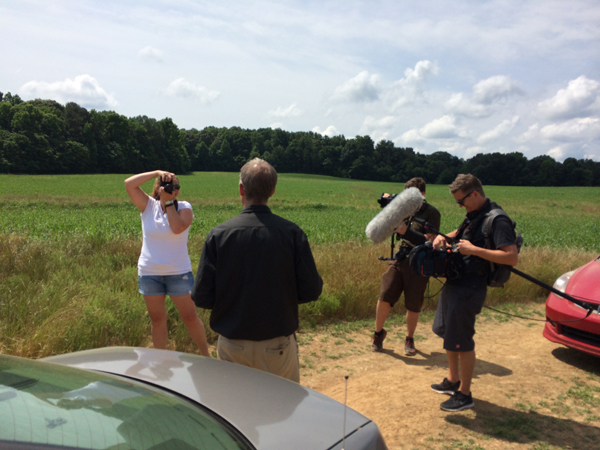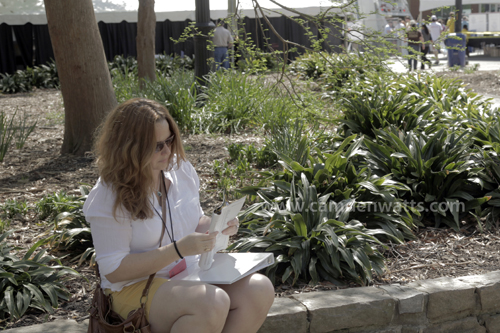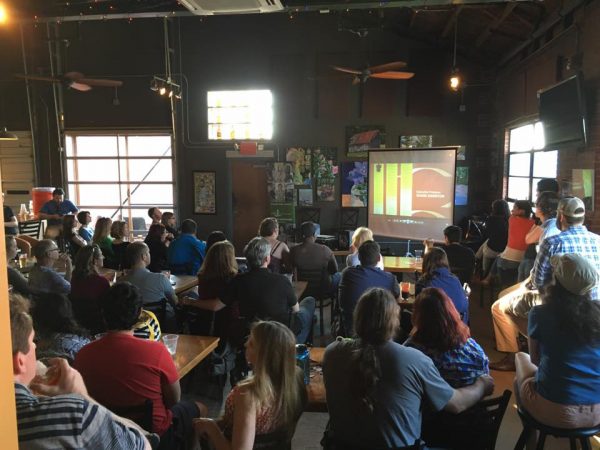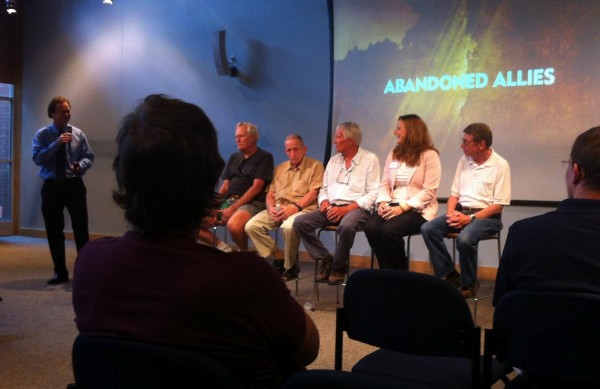To an outsider, filmmaking may seem pretty mysterious.
It can be confusing about how things get done and who’s responsible for what task, no matter the stage of production. Even when you’re on set, there are so many people doing things that it may seem like chaos.
Of course, there’s a hierarchy and a method to the madness.
Once you learn the rhythm, roles, and responsibilities, it’s a lot easier to discern what’s going on. It’s also a lot easier to appreciate who’s doing what, how hard it is to do each job, and precisely where you fit in.
For better or worse, I’ve had my hands in every stage of production. And I’ve had to learn each skill myself – the hard way, through trial and error. I highly recommend it.

Behind the scenes on Brewconomy, a documentary about NC craft beer, in 2014.
Trying it yourself is humbling, which will give you respect for each craft. I highly recommend testing out different roles in the production process, getting intimately familiar with failure, and figuring out what type of roles makes you the happiest. It’ll teach you a lot.
These days, thankfully, I’m finding ways to collaborate with people who are much more skilled at certain tasks than I will ever be, which helps me stay focused on honing my own craft: storytelling. With more experience under my belt, I’m much more confident but I’ve still got a long way to go; there’s always room to learn something new.
I’ve found that my strengths are:
- Writing
- Directing
- Producing
These are the things that I love doing.
So what’s producing?
Jeremy, a student at N.C. State University, sent me a few questions about it.
Here are my answers.
1) Can you talk about the day-to-day activities of a film producer working on a production? What sort of tasks are you responsible for? What sort of people do you work closely with?
As my dad says, “It’s all relative.”
In other words, there are many different types of productions and many different kinds of producers. The type of roles and responsibilities of a producer will depend on the production type, budget, scope of work, etc.

Shuffling release forms on the set of Brewconomy in 2013.
Speaking in broad, general terms some producers are the ones who get things done and/or keep things moving.
The Producers Guild of America says:
The producing team consists of all those whose interdependency and support of each other are necessary for the creation of motion pictures and television programs. The producing team is comprised of Producers and all those on the career path to becoming Producers, including:
Executive Producers
Producers
Co-Executive Producers
Supervising Producers
Senior Producers
Line Producers
Co-Producers
Associate Producers
Segment Producers
Field Producers
Story Producers
Production Managers
Visual Effects Producers & Coordinators
Post-Production Supervisors & Managers
Production & Post-Production Coordinators
As a unit, the producing team is responsible for the art, craft and science of production in the entertainment industry.
For my own films, I’ve been credited as the Executive Producer. That usually means you’ve had something to do with the funding for the film (and possibly little else). I have been responsible for raising the funds for my own movies, but I also had a lot of other responsibilities: writing, directing, project management, distribution, promoting, etc.

Shane Johnston, executive producer of Brewconomy, at WCHL promoting the film prior to the Carrboro Film Festival in 2015.
On Brewconomy, one of my newest films, we were lucky to have excellent producers on board. They took care of organizing the shoots, communicating with the crew, setting specs for the shoot, and getting footage to our editor – among other things. Having that team in place made it easier for me to focus on other tasks, which made it so much easier to move faster.
2) For someone interested in film production, what sort of qualities and skills do you need to have? Education level?
It depends on where you want to go.
If you’re interested in corporate video, for example, that’ll be different than getting hired to work on a major studio production. Some of the same skills may apply, but the experience may be different.

On the set of “AK” in February 2016.
In my experience, some of the things I look for in a producer are:
- Strong leadership
- Dependability and trustworthiness
- Listening skills and ability to communicate effectively (written, verbal, and nonverbal)
- Organization / project management experience
- An ease in working well with others (cast, crew, clients, etc.)
A four-year college degree, plus a few years of experience afterward is a solid start. (Experience will help you develop a lot of important things that are tough to pick up from a book – and that’s coming from a bookworm.)
Through experience, I’ve learned that clear communication – at every stage of the production – it paramount. Film and video production are complex and complicated at times. It’s important to define what you want to achieve, how you’re going to do it, and how to adjust on the fly.
Get out there, make mistakes, learn, tweak your approach, and try new things repeatedly.
3) What is your favorite thing about producing films? What do you find most rewarding? Challenging?
Producing is something I picked up out of necessity.
At one point very early in my career, I faced a fork in the road.
I could move to a bigger city and work my way up the ladder, hoping for a chance to direct one day. Or I could “bloom where I was planted” and try a truly indie route. That’s when I chose to make my own movies at my own pace using my own resources, right here in North Carolina.

Brewconomy screening at NoDa Brewing Company organized by the Levine Museum of the New South on Tuesday, May 24, 2016.
My theory was that film always comes down to business, and if you understand how the business works you have more control in certain situations. For example, having the freedom to self-select a story and how it gets shared is important to me. I want my audiences to know and trust me – for as long as I’m a filmmaker.
So I’m very judicious about the stories I tell, how they’re told, and where they get shared.
My favorite thing about producing is creating something out of nothing.
You oversee the entire process, from concept to completion. Working with the best cast and crew available is such a joy. Then you get to share the finished product with audiences and gauge their reactions. It’s a really rewarding process.
One of the most challenging part is the tedium. I’ve gotten good at things like saving receipts, but it’s certainly not my genius zone. I’m much better at creative and problem solving.
4) What advice would you give to students that would like to pursue film production as a career?
Read plenty of books, listen to podcasts, and follow artists. Watch lots of movies, commercials, and TV shows. Develop your own opinions on them.

Production stills as color references for “AK”
Give yourself time to explore, mess up and make mistakes, discover things, travel, study other cultures, create for the joy of creating – and simply enjoy where you are right now in your life. It takes time so get really good at enjoying the journey. It’s not about the destination, as they say.
Learn to be a really great friend, too. Filmmaking isn’t the end all, be all; as much as we like to think otherwise. If you learn to be a good friend, I think you could be a strong asset in the filmmaking process because trust often leads to incredible work and experience.
5) What would the best way for students to gain experience in this field while still in school?
Start taking action right now.
Taking action will prevent you from overthinking everything. You’ll learn things about yourself, what you enjoy, and what you want to learn next. Test the waters to see what interests you the most.

Discussion panel following the premiere of Abandoned Allies at IMAX on August 2012. Panel moderated by Bill Leslie, WRAL news anchor who narrated the film. Photo by David Leblond.
You can use your smart phone to shoot a sketch with friends, make a documentary, or create a video for a non-profit. Volunteer with an organization that needs your energy and enthusiasm. Find other people interested in filmmaking and create something together.
Look for internships or volunteer opportunities where you can continue learning, developing skills, and building your resume.
6) Anything else you would like to add?
Yes, definitely.
You can follow along with my own productions here on the blog. You can also follow along on Twitter, Facebook, and Instagram.
Be sure to sign up for free email updates, too!
Thank You
Thanks for the great questions, Jeremy!
If you’ve got questions about what I do, please let me know.
Use the comments below to continue the conversation or reach out on social media. I’d love to take you behind-the-scenes so you can see what it’s like to be an independent filmmaker!
